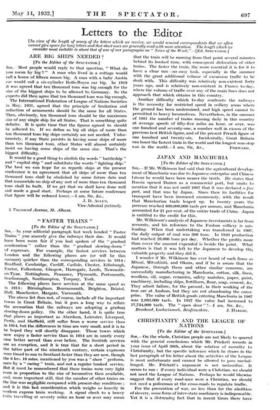Letters to the Editor
In view of the length of many of the letters which we receive, we would remind correspondents that we often cannot give space for long letters and that short ones are generally read with more attention. The length which we consider most suitable is about that of one of our paragraphs on " News of the Week."—[Ed. Secersroad
ARE BIG SHIPS NEEDED?
[To the Editor of the SPECTATOR.] Sin,—Most people would reply to that question, "What do you mean by big ? " A man who lived in a cottage would call a house of fifteen rooms big. A man with a baby Austin ear would call a six-cylinder Rolls-Royce ear big. In 1919 it was agreed that ten thousand tons was big enough for the size of the biggest ships to be allowed to Germany. So the experts did then agree that ten thousand tons was big enough.
The International Federation of League of Nations Societies in May, 1931, agreed that the principle of limitation and reduction of armaments should be the same for all States. Then, obviously, ten thousand tons should be the maximum size of any single ship for all States. That is something quite definite. It is quite time that the figures agreed to should be adhered to. If we define as big all ships of more than ten thousand tons big ships certainly are not needed. Unfor- tunately, if any State persists in having some ships of more than ten thousand tons, other States will almost certainly insist on having some ships of the same size. That's the biggest difficulty.
It would be a good thing to abolish the words "battleship" and " capital ship" and substitute the words" fighting ship." The best we can hope for as regards ships at the present conference is an agreement that all ships of more than ten thousand tons shall be abolished by some future date and that meanwhile no ship of any sort of more than ten thousand tons shall be built. If we get that we shall have done well and made a good start. Perhaps at some future conference that figure will be reduced lower.—! am, Sir, Ice., J. D. ALLEN,




































 Previous page
Previous page